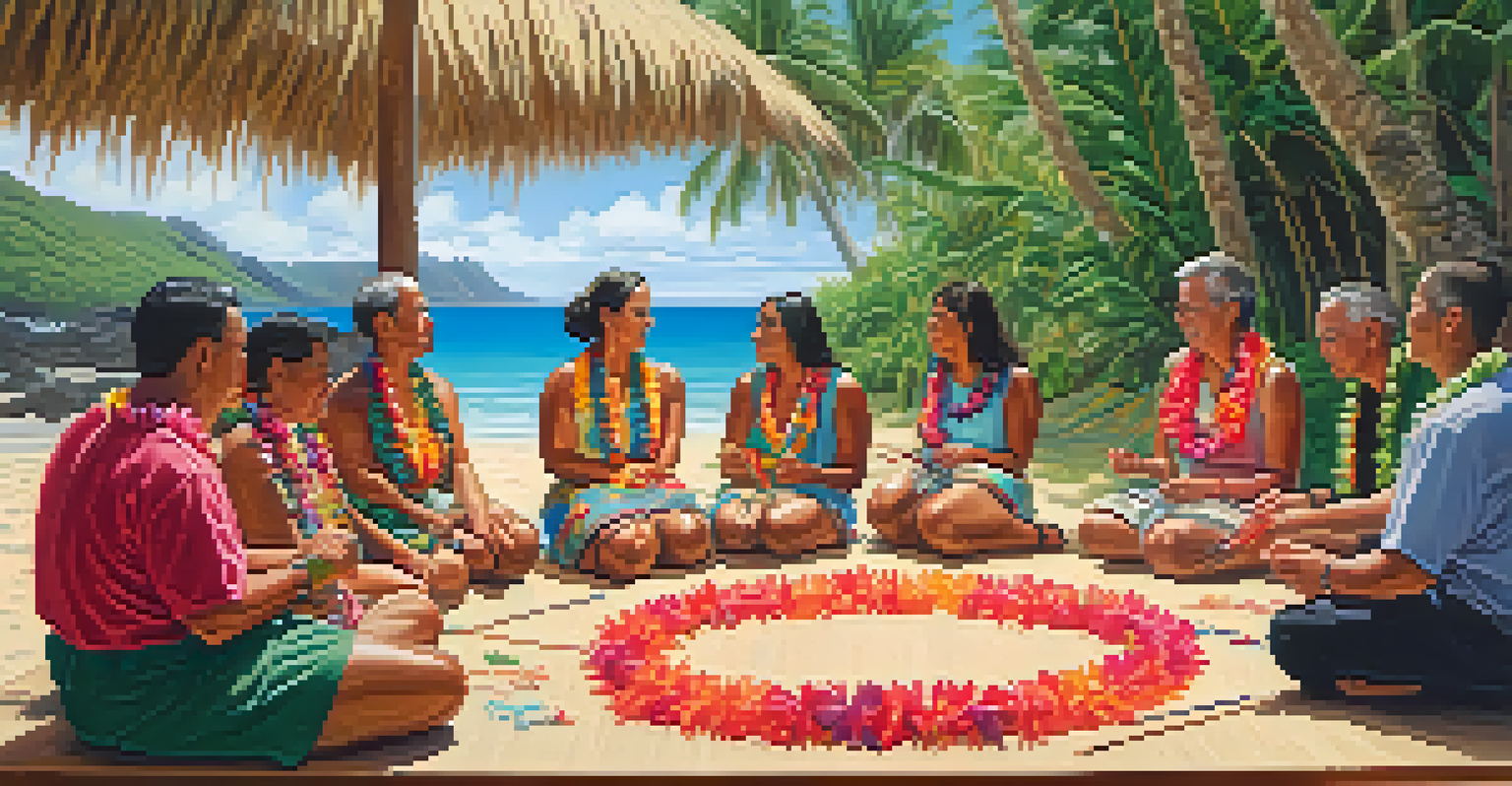Cultural Preservation in Hawaii: The Role of Ecotourism

Understanding Cultural Preservation in Hawaii
Cultural preservation in Hawaii is about safeguarding the unique traditions, languages, and practices of the islands. This is essential not just for the local communities but for the world, as these cultural elements offer insights into sustainable living and harmony with nature. The rich heritage of Hawaii, including hula, traditional crafts, and language, reflects the deep connection between its people and the land.
Preservation of one’s own culture does not require contempt or disrespect for other cultures.
As modern challenges like tourism pressure and urbanization threaten these traditions, the importance of cultural preservation becomes even more pronounced. Community efforts focus on teaching younger generations about their heritage, ensuring that the unique identity of Hawaii continues to thrive. This emphasis on cultural education helps foster pride and understanding among residents and visitors alike.
In this context, ecotourism emerges as a valuable ally. By promoting responsible travel that respects local customs and the environment, ecotourism can help fund and support preservation initiatives. It creates a bridge between visitors and the rich cultural tapestry of Hawaii, allowing for a deeper appreciation of the islands' heritage.
The Impact of Ecotourism on Local Communities
Ecotourism plays a significant role in empowering local communities across Hawaii. By prioritizing environmentally friendly practices, ecotourism fosters a sense of ownership among residents over their resources and traditions. This empowerment leads to greater engagement in cultural preservation efforts as locals see the economic benefits of maintaining their heritage.

For example, many ecotourism initiatives involve guided tours led by native Hawaiians who share their historical narratives and cultural practices. Visitors learn about the significance of the land, traditional farming methods, and local craftsmanship, creating a more meaningful travel experience. This not only enriches tourists' understanding but also provides income to the guides and their communities.
Cultural Preservation is Vital
Safeguarding Hawaii's unique traditions and practices is essential for both local communities and global understanding of sustainable living.
Furthermore, with a focus on sustainability, ecotourism encourages the protection of natural landscapes that are integral to Hawaiian culture. By preserving these environments, communities can continue to practice their traditions, such as fishing and gathering, ensuring that cultural practices remain alive and relevant.
Ecotourism’s Role in Educating Visitors
One of the most impactful aspects of ecotourism is its potential to educate visitors about Hawaii’s rich cultural heritage. Through immersive experiences, travelers gain insights into the values and traditions that shape the islands. This education fosters respect and appreciation for the local culture, which can lead to more responsible tourism practices.
The future belongs to those who believe in the beauty of their dreams.
For instance, workshops that teach traditional Hawaiian crafts, such as lei-making or weaving, provide visitors with hands-on experiences. These activities not only support local artisans but also help participants understand the significance behind each craft. When tourists leave with this knowledge, they become ambassadors for Hawaiian culture, sharing what they've learned with others.
Moreover, guided eco-tours often include discussions about the history and significance of various cultural sites. By framing these locations within the context of Hawaiian history, visitors develop a deeper connection to the land and its people. This understanding can be transformative, leading to a more respectful approach to future travel.
Challenges Faced by Ecotourism in Hawaii
While ecotourism has significant potential, it also faces various challenges in Hawaii. One major concern is the delicate balance between attracting tourists and preserving cultural integrity. As more visitors seek authentic experiences, there is a risk that commercialization could dilute the very traditions that ecotourism aims to protect.
Additionally, the environmental impact of increased tourism can strain local resources. Issues such as waste management, water usage, and habitat disruption can arise if not properly managed. Communities must work diligently to create sustainable practices that mitigate these impacts while still providing enriching experiences for visitors.
Ecotourism Empowers Locals
Ecotourism fosters local ownership and engagement in cultural preservation by linking economic benefits to the maintenance of heritage.
Finally, there is the challenge of ensuring that the benefits of ecotourism are equitably distributed among local residents. Without careful planning, profits can disproportionately favor large companies rather than the communities themselves. Addressing these challenges is crucial for ensuring that ecotourism remains a viable means of cultural preservation.
Case Studies of Successful Ecotourism Initiatives
Several successful ecotourism initiatives in Hawaii showcase the positive impact of responsible travel on cultural preservation. For example, the Malama Kauai program encourages visitors to participate in conservation efforts while learning about local traditions. This initiative not only helps preserve the environment but also fosters a deeper understanding of Hawaiian culture among tourists.
Another example is the Aloha Aina program, which connects visitors with native Hawaiian practitioners. Through workshops and guided experiences, tourists learn about traditional farming, fishing, and crafting techniques. By participating in these activities, visitors gain a genuine appreciation for the skills passed down through generations.
These case studies exemplify how ecotourism can serve as a tool for cultural preservation. They highlight the importance of community involvement and the need for sustainable practices that benefit both the environment and local cultures. When done right, ecotourism can create a win-win situation for everyone involved.
The Future of Ecotourism and Cultural Preservation
As we look to the future, the synergy between ecotourism and cultural preservation in Hawaii holds great promise. With growing awareness of sustainable travel, more visitors are seeking authentic experiences that respect local cultures. This shift in consumer behavior can lead to increased support for initiatives that prioritize preservation efforts.
Moreover, technology can play a role in enhancing ecotourism experiences. Virtual reality, for instance, can provide educational content about Hawaiian culture to visitors before they even step foot on the islands. This can prepare tourists to engage more thoughtfully with the local culture during their visit, creating a more respectful travel experience.
Education Enhances Visitor Experience
Immersive ecotourism experiences educate travelers about Hawaiian culture, fostering respect and responsible tourism practices.
Ultimately, the future of ecotourism in Hawaii hinges on collaboration among stakeholders, including local communities, government, and the tourism industry. By working together, they can create a sustainable model that not only preserves Hawaiian culture but also enriches the experiences of those who visit the islands.
How You Can Contribute to Cultural Preservation
As a traveler, you can play an active role in supporting cultural preservation in Hawaii through your travel choices. Opt for ecotourism experiences that prioritize local engagement and sustainability. By choosing to support businesses that respect and promote Hawaiian culture, you contribute to the preservation of these traditions.
Learning about the history and cultural practices of Hawaii before your visit can also make a meaningful difference. This preparation allows you to engage more thoughtfully with the community and its traditions. Respect the customs and values of the local people, and be mindful of your impact on the environment.

Lastly, sharing your experiences and insights with others can amplify the message of cultural preservation. By promoting responsible travel practices, you can inspire fellow travelers to appreciate and protect the rich heritage of Hawaii. Every small action counts in the broader effort to safeguard these invaluable cultural treasures.